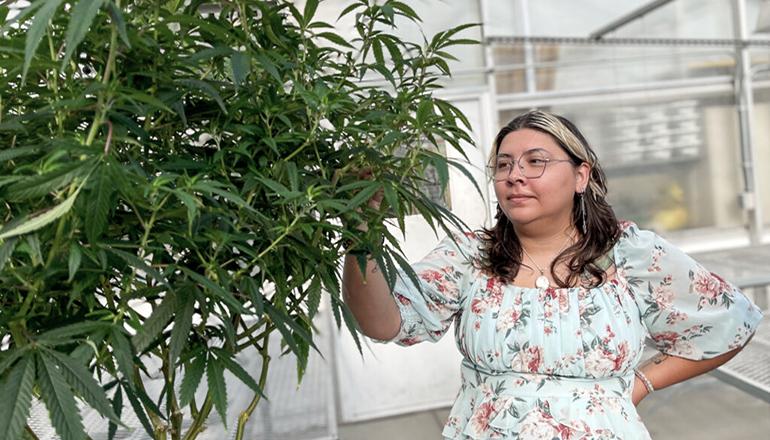(Missouri Independent) – Karina Hernandez’s ideal work environment is surrounded by plants, with her hands in the dirt.
Although she already has a biology degree, she recently decided to go back to school to take classes in horticulture at St. Louis Community College at Meramec, the state’s largest horticulture program.
And she was surprised to see courses on hemp and cannabis cultivation on the list.
On the first day of her Introduction to Cannabis course this semester, she and her fellow classmates shared why they wanted to take the class.
“It’s a growing industry, so it’s cool to be at the forefront,” Hernandez said. “As long as I’m not sitting at a desk — and I feel like that’s a lot of people here.”
Many of her classmates agreed the cannabis market just might be their ticket to a career working in plant science.
Student interest is likely why the number of cannabis certificate programs at colleges has rapidly expanded in Missouri. A majority of the programs are online courses, but some — including the one at Meramec — are providing hands-on instruction using hemp plants.
Now for the first time, beginning this semester, Missouri students can get a bachelor’s degree in cannabis and natural medicinals at Truman State University in Kirksville.
“Everybody that we’ve talked to who’s currently in the industry are all really excited about the potential of having students who are coming out with an undergraduate degree,” said Tim Walston, Truman’s dean of science and mathematics, “and that they could take into their workforce right away.”
Marijuana sales in Missouri have been averaging about $120 million a month since March. That means the Missouri industry will easily surpass $1 billion in its first year of recreational marijuana sales.
A booming industry means more jobs.
Since November when Missourians voted to pass a constitutional amendment legalizing recreational marijuana, the number of licensed marijuana employees has increased by nearly 8,000 — bringing the total up to 17,615 employees statewide, according to the state’s August report.
“I have companies contacting me constantly saying, ‘We are looking for X, Y, Z employee,’” said Stacy Godlewski, manager of the St. Louis University’s cannabis science and operations online certificate program. “I am sharing job opportunities constantly with the students, and the students are reporting back getting hired within the industry before even graduating from the program.”
Preparing students for ‘green jobs

St. Louis University was among the first two Missouri colleges to launch online cannabis certificate programs in 2020, along with Northwest Missouri State University. Godlewski said SLU was nudged to do so by Mitch Myers with St. Louis-based BeLeaf Medical, the first medical marijuana company to begin operations in the state.
“It was Mitch Myers of BeLeaf who actually came to St. Louis University and said, ‘You know, we’re about to go medically legal. We need to educate the employees of the industry. And, you know, why not SLU,’” Godlewski said.
And it’s now SLU’s most popular professional studies program.
What makes their program unique, Godlewski said, is the number of experts in the field who teach the courses — including Kayla Brown, director of human resources, compliance and legal at Vibe Cannabis in St. Louis.
“The majority of the questions that I get asked are, ‘How did you get into the industry? And how should I do it?” Brown said. “The program does a great job of giving them such a full spectrum of options.”
This semester, Metropolitan Community College in Kansas City launched an online program, partnering with California-based company Green Flower. Students can get three certificates including for cannabis cultivation specialist, cannabis retail specialist, and for cannabis extraction & product development specialist.
Both Truman and St. Louis Community College say what sets their programs apart is the fact that students can work directly with hemp plants. Because the institutions receive federal funding, they can’t use marijuana plants in instruction. However, the 2018 farm bill took hemp off the federal controlled substance list, and that makes hemp plants a good substitute.
“We actually work with live hemp plants in this program, which is unique,” said Patrick Vogan, assistant professor of horticulture. “We really do think that will help to prepare students.”
The college first offered its intro to cannabis in the fall of 2021, and last spring the college added a cannabis and hemp cultivation class. Vogan co-taught the cultivation course with the manager of a cultivation facility, which they’ll do again this year. Now this fall, the college has added an extractions class.
St. Louis Community College is hoping to soon gain approval of its program from the Missouri Department of Higher Education and Workforce Development, Vogan said.
So far, the department has approved two cannabis programs statewide — Truman’s and Southeast Missouri State University’s in Cape Girardeau.
At Southwest, horticulture and cannabis is an option within the agribusiness bachelor program, and it was added in June 2022. It’s not a full program like Truman’s, a department spokesman said.
Southwest’s program focuses on preparing students for “green jobs that include sustainable food horticulture to greenhouse management.”
Truman aims to distinguish itself by focusing on natural medicine and holistic healing in its program, as well.
“We do want to focus on cannabis,” Walston said, “but there’s also a growing industry of other natural medicinals — things like essential oils and plant based medicine.”
The degree program would provide a foundation for students to explore the scientific, cultural, and legal backgrounds of natural medicines, he said.
“A lot of it has been around for centuries or millennia,” he said, “but people are just now starting to go back to it.”
(Photo by Revecca Rivas – Missouri Independent)


